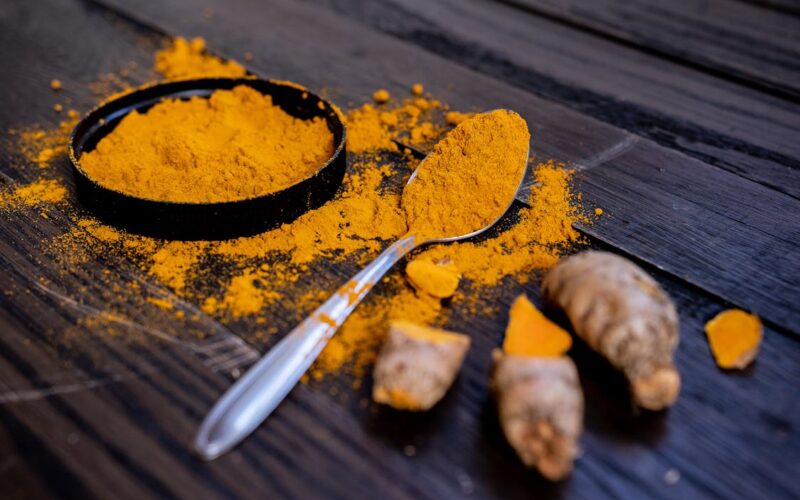Turmeric, a vibrant yellow spice long celebrated in traditional Indian medicine, is gaining recognition in the Western world not only for its ability to enhance flavor and color in dishes but also for its therapeutic properties. Central to turmeric’s health benefits is curcumin, a compound that has been extensively studied for its potential to manage and alleviate symptoms of chronic inflammatory conditions, including ulcerative colitis (UC).
What is Curcumin?
Curcumin, the principal curcuminoid found in turmeric, is responsible for the spice’s distinctive golden hue and many of its health benefits. It boasts powerful anti-inflammatory and antioxidant properties, making it a compelling natural treatment option for inflammatory diseases such as ulcerative colitis. Curcumin’s anti-inflammatory action is primarily due to its ability to inhibit key molecules involved in inflammation, including the nuclear factor kappa B (NF-κB), a protein complex that plays a critical role in cytokine production. By blocking this pathway, curcumin effectively reduces the inflammatory responses that exacerbate UC, leading to fewer flare-ups and alleviated symptoms.
Additionally, curcumin’s role as an antioxidant is integral to its therapeutic profile. It actively scavenges reactive oxygen species (ROS) and other free radicals, which are known to cause oxidative stress and cellular damage. This oxidative stress is particularly harmful in the mucosal lining of the intestines of UC patients, exacerbating inflammation and contributing to symptom severity. By neutralizing these harmful compounds, curcumin not only helps protect cells from damage but also supports the overall integrity and health of the gastrointestinal tract.
Curcumin and Ulcerative Colitis
Ulcerative colitis is a chronic inflammatory bowel disease characterized by inflammation in the lining of the colon and rectum. The anti-inflammatory effects of curcumin can be particularly beneficial in ulcerative colitis by helping to reduce gut inflammation and promote healing.
1. Anti-inflammatory Properties
Curcumin works by inhibiting the activity of cytokines and enzymes that contribute to inflammation in the body. Research shows that curcumin can suppress the production of inflammatory markers like tumor necrosis factor-alpha (TNF-α) and interleukins, which play significant roles in the exacerbation of UC.
2. Antioxidant Effects
Oxidative stress contributes to the damage in the colon tissue in UC patients. Curcumin’s strong antioxidant properties can help mitigate this by neutralizing free radicals, thereby protecting the cells from damage and improving intestinal health.
3. Enhancing Barrier Function
Curcumin can enhance the function of the gut barrier, which is often compromised in UC patients. By strengthening this barrier, curcumin helps prevent pathogens and toxins from entering the bloodstream, which can worsen inflammation and symptoms.
4. Symptom Relief
Patients have reported a reduction in symptoms such as diarrhea, bloody stools, and abdominal pain after incorporating curcumin into their regimen. While these anecdotal reports need further backing through comprehensive studies, they are promising indications of curcumin’s potential.
Pediatric Ulcerative Colitis: A Guide for Parents
Incorporating Curcumin in UC Management
Dietary Inclusion
Adding turmeric to your diet can be a simple way to consume more curcumin. It can be incorporated into soups, stews, rice dishes, and smoothies. However, curcumin has low bioavailability, which means it is not easily absorbed by the body. Combining turmeric with black pepper, which contains piperine, can enhance absorption significantly.
Supplements
Curcumin supplements are another effective way to ensure adequate intake. These are available in capsules, tablets, or powders and often include piperine or other agents to increase bioavailability.
Consultation with Healthcare Providers
Before starting any new treatment, including curcumin supplements, it is crucial to consult with a healthcare provider, especially for those with ulcerative colitis, to avoid any potential complications or interactions with other medications.
Conclusion
Curcumin offers a promising natural approach to managing ulcerative colitis, primarily due to its potent anti-inflammatory and antioxidant properties. Although more research is necessary to fully elucidate its therapeutic benefits and determine the most effective dosages, curcumin represents a hopeful option for those exploring complementary treatments in their fight against ulcerative colitis. Its ability to modulate inflammatory pathways and combat oxidative stress makes it an attractive supplement to standard medical treatments, potentially enhancing overall disease management and quality of life for patients.


